A stethoscope and a badge
By Alex Branch
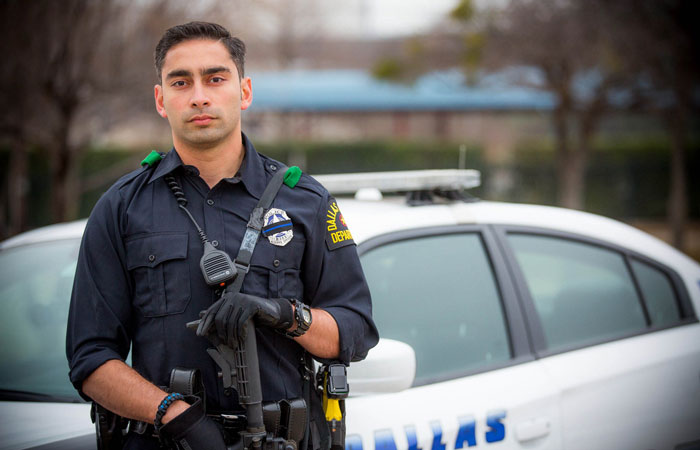
Faroukh Mehkri has worn two very different uniforms for the last four years.
One is the crisp white medical coat and hospital scrubs – with a stethoscope around his neck – of a medical student at UNT Health Science Center, worn while he pursues his degree as a doctor of osteopathic medicine.
The other is the crisp navy-blue uniform – with a service weapon and handcuffs on his hip – of an officer in the Dallas Police Department, worn as he patrols the neighborhoods of southeast Dallas.
The Texas College of Osteopathic Medicine prides itself on preparing all 230 students who enter the school each year for a lifetime of service through medicine. This spring Mehkri will earn the distinction of finishing medical school while also serving others as a reserve Dallas police officer.
“Law enforcement and medicine are two things I’m passionate about,” Mehkri said. “It’s the perfect combination of what I want to do with my life.”
Following his dreams hasn’t always been easy. A typical day in medical school starts with Mehkri rising in the early morning to review notes for tests and quizzes. Then it’s off to the Health Science Center for class, lab work or perhaps a two- and-half-hour exam in renal pathology.
He grabs a quick lunch, often Chick-fil-A, and makes the 35-mile drive to a southeast Dallas police substation. He hastily changes into his patrol uniform, straps on a 20-pound utility belt and, if time permits, squeezes in a few minutes of studying before his 3 p.m. patrol detail.
Before patrol, officers gather with their sergeant to review the first-shift incidents. The sergeant always completes Mehkri’s daily transition from student to police officer with three words:
“Get to work!”
The streets
On a wet, dreary January day, Mehkri and his partner, Senior Cpl. J. Shipp, navigate a Dallas police cruiser through neighborhoods plagued by poverty and crime.
Together, the officers have dodged gunfire, chased criminals into dark alleys, kicked in doors and built relationships with residents tired of crime and hopelessness.
“Some days you find yourself in pretty intense situations; it’s zero to 100 in the blink of an eye,” Mehkri said. “But you also meet people – families – living in the most difficult circumstances, and you can empathize with them.”
The first call they respond to is a business owner’s complaint of young men selling drugs outside a convenience store. Mehkri and Shipp find two men matching the suspect descriptions standing idly by a payphone as a third suspect disappears behind the store.
“What’s going on?” Mehkri asks, stepping out of the car.
The men shrug. They have a few minor warrants, but the officers pat them down and find no drugs or weapons. The warrants aren’t worth making arrests, so the officers ask the men to move along.
Mehkri is an excellent officer, said Shipp, who trained Mehkri on patrol in 2013. But fellow officers also like having him around during medical emergencies on the job.
Mehkri has used his medical training to treat officers injured in car crashes or in scuffles with suspects who resist arrest. He quickly recognizes overdose cases.
Once at a rural methamphetamine lab, Mehkri stopped officers from opening bags of a substance that he recognized as a poisonous organophosphate waste product of an ingredient often used in the meth cooking process. If officers had inhaled it, they could have suffered blurred vision, nausea and vomiting.
Unlike other officers, Mehkri carries three tourniquets on his utility belt.
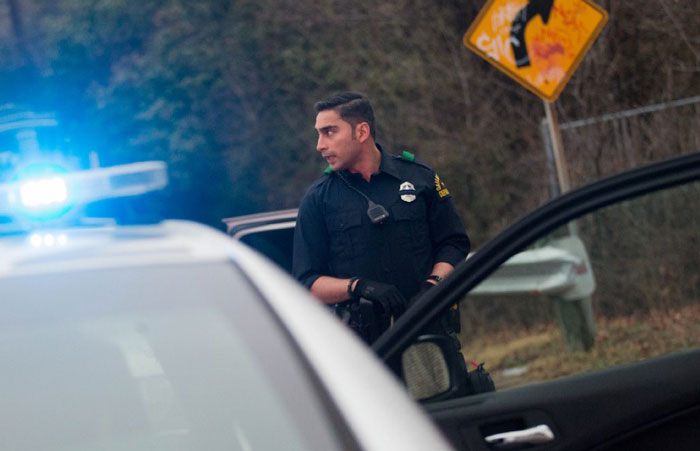
“Most officers are trained to do basic CPR and put pressure on wounds and that’s about it,” Shipp said. “So when a medical issue arises, it is awfully nice to have Faroukh with you.”
Passion for service
Mehkri’s drive to serve others may date back to when his parents, both physicians, moved their young family from Brooklyn to South Texas.
His parents wanted to practice somewhere with a dire need for medical care, and they chose the city of McAllen near the Mexican border.
“I had been raised in New York so I got off the plane and asked my dad where all the tall buildings and taxis were,” Mehkri said. “But it was a great experience. I was in this wonderfully diverse place, and my parents took care of a lot poor families who otherwise might not get quality health care.”
After high school, Mehkri attended Rice University. Playing pool as a freshman in a dormitory game room, he saw a fellow student suffer a seizure. Mehkri watched a team of college-age emergency medical technicians arrive and treat the student.
“Wow, I want to do that,” Mehkri thought.
Mehkri completed the required 750 hours of Advanced EMT training and spent most of his college years responding to campus 911 calls. He also rode with Houston ambulance crews and worked in the emergency room at Ben Taub Hospital in Houston.
After Mehkri was accepted into medical school at UNT Health Science Center, he thought about several older EMTs he had met who also were sworn Harris County law enforcement officers. He admired their dual service. So he called the TCOM admissions office and asked if he could delay starting medical school for one year while he entered the police academy.
“Go for it” was the answer.
A SWAT doc
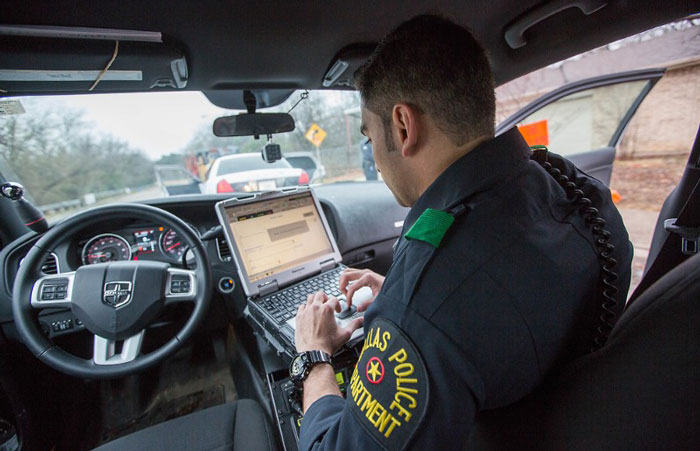
In their patrol car, Mehkri and Shipp watch a white sedan with heavily tinted windows speed recklessly through heavy traffic on a three-lane roadway. Lights flashing, Shipp hits the gas and catches up to the sedan, which eventually stops.
It’s a tense moment. The officers can’t see anything through the tinted windows. Mehkri and Shipp have their hands on their gun belts as they approach the car.
The driver is 19 and seems oblivious to why he was stopped.
“Hopefully we’ll change his mind,” Mehkri said.
Patrol is not all Mehkri does as a reserve officer. He also works closely with Dallas Police Deputy Medical Director Lt. Alex Eastman, who also is the chief trauma surgeon at Parkland Memorial Hospital. Lt. Eastman is known as a “SWAT Doc,” a member of Dallas SWAT who provides medical care for the specialized team of officers often in harm’s way.
Mehkri has joined Lt. Eastman at special events such as the annual Oklahoma-Texas college football game and President Donald Trump’s visit to Dallas last year. He also spent a month with Lt. Eastman at the Parkland Trauma Service.
“There was a weekend we worked 40 out of 48 hours between the two jobs, but it was worth it,” Mehkri said. “It is an incredible experience walking the line between two high-speed professions that care for people in their worst hours.”
But first Mehkri must finish his last semester of medical school. The hospital scrubs he wore when he arrived at the substation that afternoon were waiting in his locker. This spring he’ll get married and learn where he matches to fulfill a three-year emergency medicine residency.
Despite the long hours his residency will require, Mehkri already has contacted police departments in cities where he interviewed.
“Wherever I go,” he said, “my goal is to always intertwine these skills to be a good tactical medical provider.”
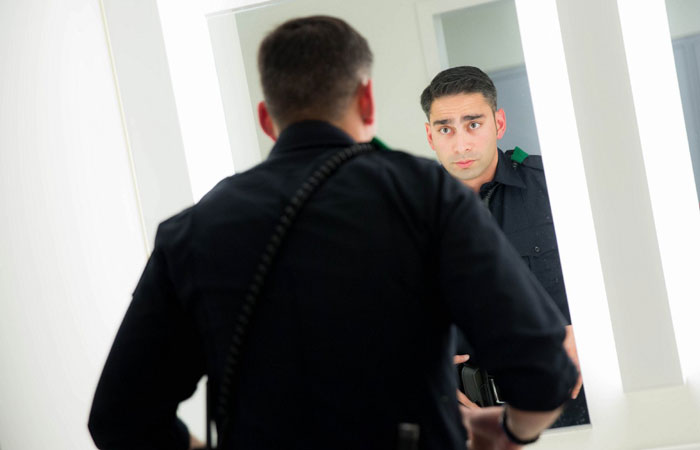
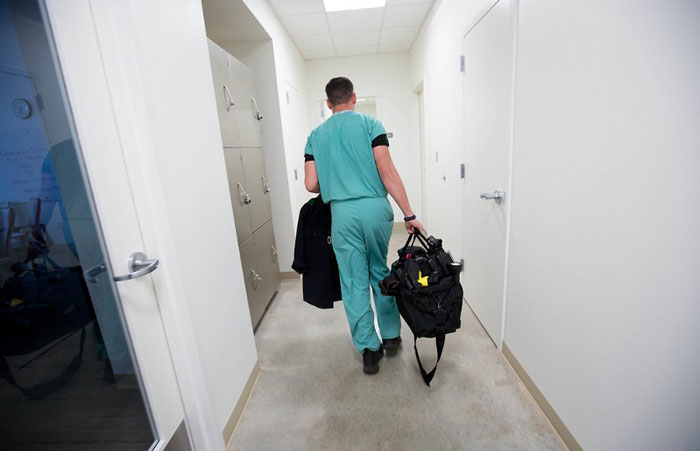


![Uyen Sa Nguyen Scaled[58]](https://www.unthsc.edu/newsroom/wp-content/uploads/sites/16/Uyen-Sa-Nguyen-scaled58-145x175.jpg)


Social media